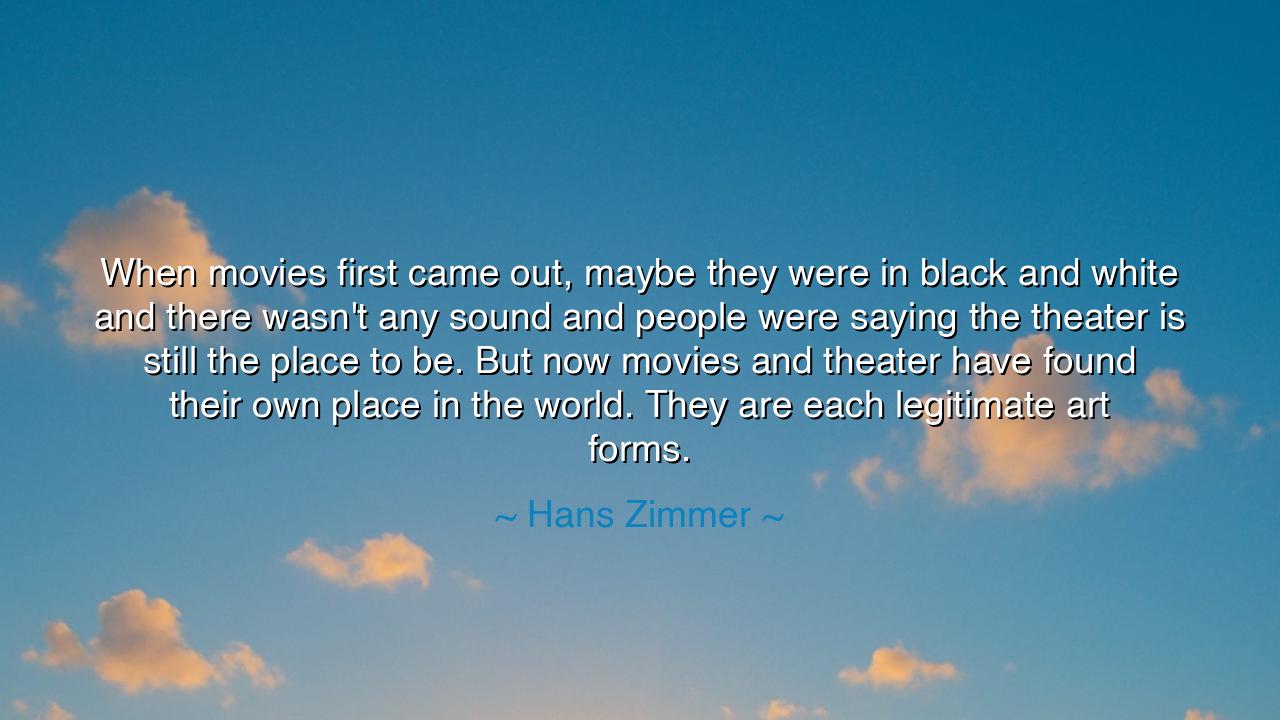
When movies first came out, maybe they were in black and white
When movies first came out, maybe they were in black and white and there wasn't any sound and people were saying the theater is still the place to be. But now movies and theater have found their own place in the world. They are each legitimate art forms.






When the master of sound, Hans Zimmer, speaks of movies and theater, he is not only speaking of art, but of the way of all things that come into this world. In his words, there is the recognition of an eternal truth: that when a new form arises, the old fears for its survival. Yet in time, both may flourish, each finding its rightful place, each revealing its own glory. The ancients too understood this; when iron was forged, stone was not abandoned, but used alongside it. So too do we see in the tale of cinema and stage a parable for all creation.
At first, the moving pictures, silent and bound in black and white, came forth like children learning their first steps. The theater, proud and ancient, looked upon this newcomer with suspicion. Many said: “The new will slay the old, the stage will wither, the voice of the actor will be lost forever.” Yet as time unfolded, men discovered that theater had a power untouched by the screen, and film revealed a vastness unknown to the stage. What seemed rivals became companions, each reaching places the other could not.
Think of the story of the painter and the photographer. When the camera was born, many believed painting had breathed its last. “Who will need brush and canvas,” they said, “when a machine can capture the face of truth in an instant?” Yet painting did not perish. Instead, freed from the burden of mere imitation, it soared into new realms: impressionism, abstraction, and visions the eye itself could not behold. The camera told one truth, but the brush told another. Both were truths of the human spirit. So it is with film and theater, each an art form whose roots dig deep into different soils.
The quote of Zimmer carries with it a heroic reminder: do not fear the new, nor despise the old. Just as the chorus in the tragedies of Athens once gave voice to the divine, and just as the flickering images of early cinema spoke to the imagination of the masses, so every age brings forth a new vessel of beauty. But each vessel, whether born yesterday or in centuries past, holds water drawn from the same well—the longing of the human heart to express, to tell, to endure.
Recall the tale of Shakespeare’s words brought to the screen. Laurence Olivier once stood upon the stage as Hamlet, and later he carried Hamlet into the world of film. Some wept in the theater, feeling the living breath of the actor’s voice. Others wept in the cinema, beholding the same tragedy framed in light and shadow. Who among them was wrong? None. For both mediums gave life to the same truth, yet through different forms. Here lies Zimmer’s teaching: legitimacy does not come from novelty or from age, but from the sincerity of art itself.
Let this wisdom flow into your own life. When you see the rise of the new, do not cast aside the old as relic. When the old clings with pride, do not despise the new as intruder. Rather, ask: what is the gift of each? For just as theater and film found their balance, so too can tradition and innovation live in harmony in your own craft, in your work, in your spirit.
And the lesson for you, traveler of life, is this: embrace both the ancient and the modern. Study the wisdom of those before you, yet welcome the inventions of your time. If you are a creator, let your work take nourishment from many streams, not one alone. If you are a listener, open your heart to every form in which beauty may come. Take courage: what seems a threat today may tomorrow reveal itself as an ally.
Thus, when you hear Zimmer’s words, remember that all art forms are legitimate, all expressions of the human soul are worthy. Do not cling in fear, but stand in awe before the endless unfolding of creation. And in your own life, be as the artist: bold enough to try the new, humble enough to honor the old, and wise enough to see the beauty in both.






AAdministratorAdministrator
Welcome, honored guests. Please leave a comment, we will respond soon